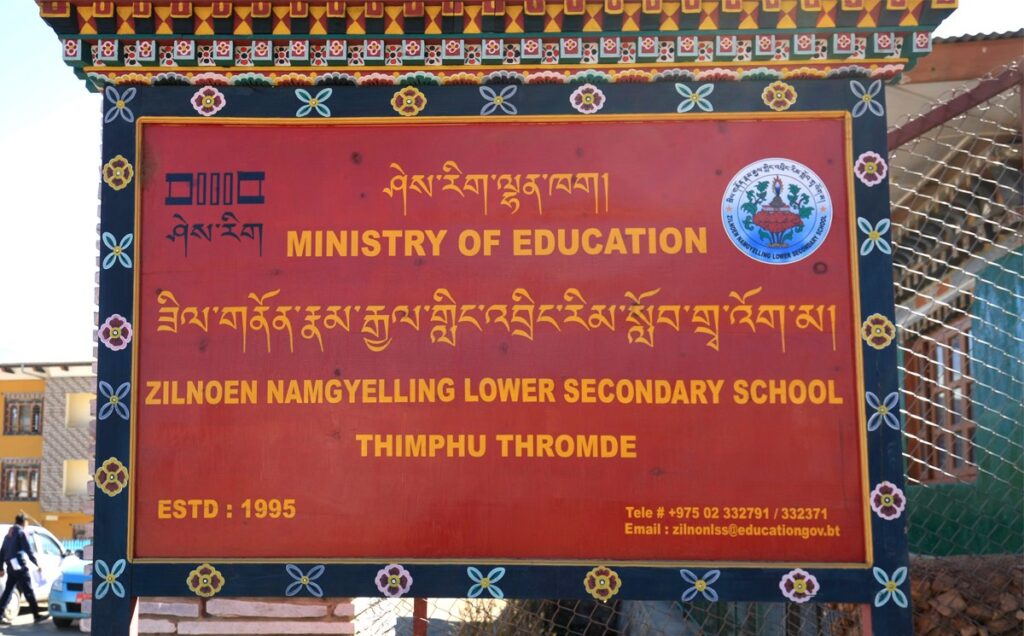
Education


Education in Bhutan is Free and plays a pivotal role in shaping national identity, promoting socio-economic development, and advancing the principles of GNH. With ongoing reforms, investments in infrastructure, and capacity-building efforts, Bhutan aims to provide inclusive and quality education that prepares its youth for the challenges of the future while preserving its unique cultural and environmental heritage.
Here’s an overview of education in Bhutan:
1. Educational System
- Structure: The education system in Bhutan is divided into three main levels:
- Primary Education: Covers classes Pre-Primary to 6 (ages 6-12).
- Secondary Education: Divided into Lower Secondary (classes 7-10, ages 13-16) and Higher Secondary (classes 11-12, ages 17-18).
- Tertiary Education: Includes universities, colleges, and vocational institutions.
2. Curriculum and Pedagogy
- GNH Integration: The curriculum emphasizes the principles of Gross National Happiness (GNH), including values education, environmental sustainability, cultural heritage, and community engagement.
- Languages: Instruction is primarily in English and Dzongkha (national language), with efforts to preserve and promote other regional languages.
3. Educational Institutions
- Schools: Schools are spread across urban and rural areas, catering to diverse communities. There are efforts to improve infrastructure and resources in remote regions.
- Higher Education: Bhutan has several colleges and the Royal University of Bhutan (RUB), which oversees tertiary education institutions offering undergraduate and postgraduate programs.
4.Education Indicators and Outcomes
- Literacy Rate: Bhutan has achieved high literacy rates, with significant improvements in access to primary and secondary education over the past decades.
- Gender Parity: Efforts to achieve gender parity in education have been successful, with equal opportunities for boys and girls in accessing education at all levels.
5. Special Education Needs (SEN)
- Inclusive Education: Bhutan is committed to inclusive education for children with disabilities and special needs, ensuring they have access to appropriate support and accommodations.
- Resource Centers: Special education resource centers provide specialized services, training for teachers, and resources to support the learning needs of SEN students.
6. Teacher Training and Development
- Teacher Education: The Royal Institute of Education (RIE) provides pre-service and in-service training for teachers, focusing on pedagogy, subject knowledge, and GNH integration.
- Professional Development: Continuous professional development programs aim to enhance teaching skills, ICT literacy, and leadership among educators.
7. Challenges and Initiatives
- Access and Equity: Efforts are ongoing to improve access to education, particularly for marginalized groups and remote communities.
- Quality Improvement: Initiatives include curriculum reforms, assessment strategies, and quality assurance mechanisms to enhance learning outcomes and relevance.
- Technical and Vocational Education: Emphasis on skills development through vocational education and training (TVET) programs to meet workforce demands and promote entrepreneurship.
8. Education for Sustainable Development
- Environmental Education: Integration of environmental education into the curriculum to promote sustainable practices and environmental stewardship.
- Cultural Preservation: Efforts to preserve and promote Bhutanese cultural heritage through education, including traditional arts, music, and literature.
9. International Cooperation
- Educational Exchange: Bhutan participates in educational exchange programs, scholarships, and partnerships with international organizations and countries to enhance educational opportunities and resources.
- Global Citizenship: Emphasis on fostering global citizenship, intercultural understanding, and collaboration through international education initiatives.
Related
- Accomodation
- Bhutan Tourism Policy
- Businesses
- Currency
- Drink & Beverage
- Education
- Festivals
- Food & Restaurant
- GNH – Gross National Happiness
- Health Care
- How to get to Bhutan
- Language
- Media
- Night life
- Politics
- Population
- Religion
- Telecommunication
- Tour Booking info
- Transportation
- Weather
Need Assistance?
Need Help? Call us or drop a message. Our agents will be in touch shortly.
Call Us : +975-17351324
+975-17495729
Email Us : adbhutantours@gmail.com
Call Us : +975-17351324
+975-17495729
Email Us : adbhutantours@gmail.com
Send your Queries
